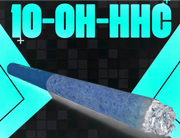
Neo-Cannabinoids: A Threat to Health?
Laboratory hemp
The cannabinoid market has exploded in recent years with the arrival of new substances derived from hemp, called neo-cannabinoids , among which we find compounds such as THCP (Tetrahydrocannabiphorol), HHC (Hexahydrocannabinol) and many others regularly promoted by unscrupulous sellers.
Although these substances are increasingly present in cannabis products, they raise many questions about their safety , effects and production method. Their potential danger to public health is now a growing concern.
Substances with largely unknown effects
Unlike CBD or THC, neo-cannabinoids such as THCP and HHC are recent and relatively poorly studied compounds. While THC and CBD benefit from years of scientific research, these new molecules have not yet been the subject of in-depth studies. The lack of reliable clinical data on their short- and long-term effects represents a major risk for consumers, who could ingest substances with unpredictable consequences for their health .
THCP, for example, is said to be 30 times more potent than THC, the main psychoactive molecule in cannabis. This suggests much more intense psychotropic effects, but these effects have not yet been properly evaluated, nor has their toxicity .
As for HHC, it is often presented as a “legal” alternative to THC, but its interaction with the body, particularly with the endocannabinoid system, is still largely unknown .
Disturbing production methods
In addition to the lack of knowledge about the effects, the production of neo-cannabinoids raises serious questions. These substances are not naturally found in large quantities in hemp and require complex chemical synthesis processes to be isolated and produced on a large scale .
In many cases, these processes involve the use of chemical solvents and other products that are potentially hazardous to health. The lack of strict regulation in the manufacturing of neo-cannabinoids also leaves much room for uncertainty regarding the purity and quality of products available on the market . Toxic chemical residues could end up in finished products, exposing consumers to additional risks.
Insufficient regulation and a fuzzy market
The neo-cannabinoid market often takes advantage of the legal gray areas left by cannabis legislation. While THC and CBD are increasingly regulated in many countries, neo-cannabinoids such as THCP and HHC often escape any clear regulation . Their legal status is uncertain, which allows companies to market products containing these substances without adequate control of their composition or safety .
The lack of strict regulation opens the door to abuse by manufacturers , who are not required to declare all ingredients or provide rigorous safety tests. Consumers may therefore be exposed to potentially dangerous products without being fully aware of it.
Risks to mental and physical health
The effects of neocannabinoids on mental health are not well documented, but the intensity of their psychoactive properties could amplify the risks of psychotic disorders, anxiety, paranoia, and even depression . THCP, for example, being much more potent than THC, could lead to more serious adverse effects, including hallucinations, loss of control, and anxiety attacks.
From a physical point of view, these new molecules could also pose risks for cardiovascular, hepatic, and even neurotoxic health , given that the body is not accustomed to metabolizing these compounds. Without solid toxicological studies, it is impossible to know whether these substances are safe in the long term , and there are legitimate concerns about their impact on vital organs.
Necessary vigilance
Faced with this situation, the vigilance of health authorities and consumers is essential. Neo-cannabinoids, such as THCP and HHC, must be thoroughly studied before being put on the market in such a widespread manner. Science must not be overtaken by marketing, especially when it comes to products that are potentially dangerous to health.
It is crucial that strict regulations are quickly put in place to govern the production, marketing and consumption of these new substances. Manufacturers must be held responsible for the safety of their products , and rigorous controls must be imposed to guarantee the quality of the ingredients used.
CONCLUSION
Neo-cannabinoids, such as THCP and HHC and others that are emerging successively after the ban by the authorities, represent today a silent threat to public health . The lack of research, unregulated industrial production and the absence of rigorous control over their distribution leave consumers in a situation of vulnerability in the face of products with unpredictable effects. Before being seduced by the promises of these new molecules, it is essential to weigh the risks and demand solid scientific evidence on their safety.
For <MONRITUELCBD> , no compromise, we will only offer you products directly from producers, without addition or reduction, without synthetic molecules! Naturalness at the forefront, that's our credo.
Pending further studies and appropriate regulation, caution is advised: it is best to avoid these substances until their safety is fully confirmed, or until they are banned by the competent authorities...






